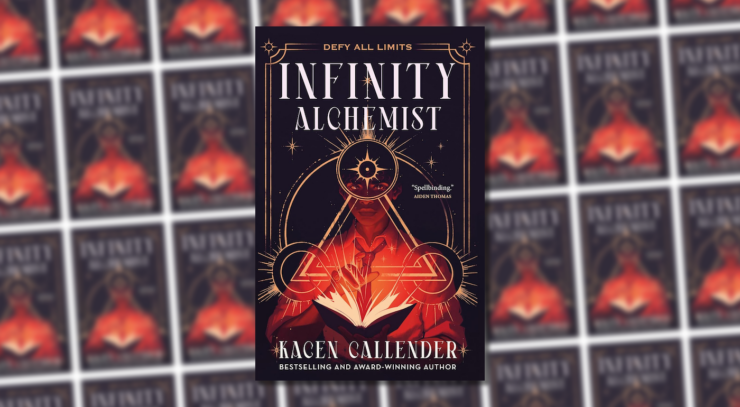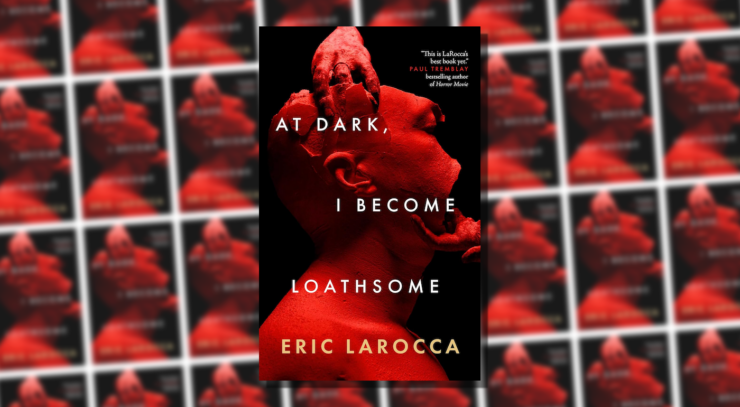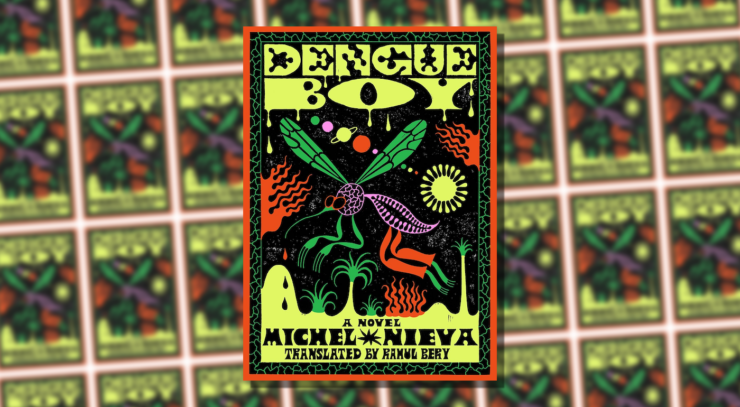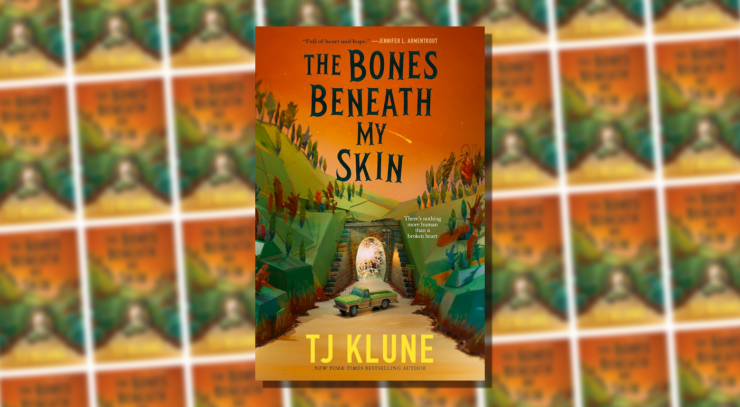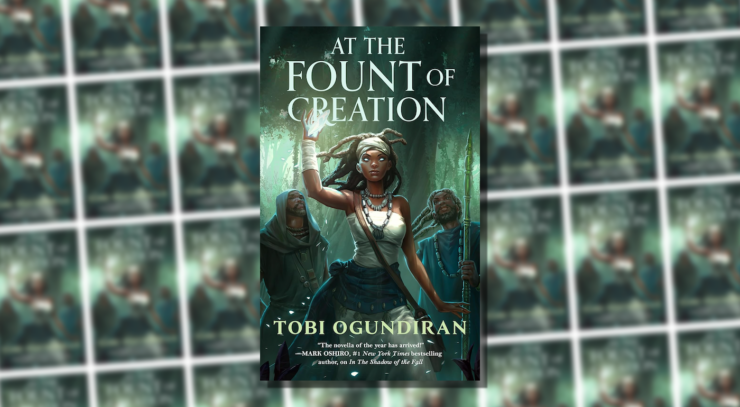The whole time I was reading Kacen Callender’s Infinity Alchemist, I couldn’t stop thinking: Damn, this book rules. Yes, it has a lot of the elements that rightfully get attention right now: queer and trans characters of color, dark academia, sexy polyamorous romance, struggles with the legacy of one’s parents, a heady magic system, and a set of governing Houses each with specific disciplines. But these aspects are not what makes Infinity Alchemist such a terrific read. Callender’s first young adult fantasy is more than the sum of its parts, building its riproaring plot around an ambitious meditation on interconnectedness and power. I won’t say I couldn’t put the book down, but I will say every time real life forced me away from my reading, I daydreamed about the world of Ash, Ramsay, and Callum until I could return to it.
Infinity Alchemist is set in New Anglia, a state where practicing alchemy (magic) requires a license. The only way to pass the licensing test is to be trained to pass it, which involves memorizing a lot of obscure facts about the history of alchemy. (Reminiscent of US citizenship tests, anyone?) What makes this even more infuriating is that everyone has the power for alchemy, as alchemy consists of channeling the energy that forms all life, known in New Anglia as Source. All humans practice tier 1 alchemy simply by being alive; those that excel in some realm, such as artists or dancers, unintentionally practice tier 2. But tier 3 and above? If you don’t have a license and get caught doing a working, you are reported to the redguards and either imprisoned or—if you’re a big enough problem—hung. The stated reason behind this regulation of alchemy is that many in this world don’t trust it, and unmonitored alchemists are dangerous. In fact, the followers of House Lune, one of the ruling families of New Anglia, aggressively campaigns against alchemists, calling them sinners and advocating for them all to be executed.
Buy the Book
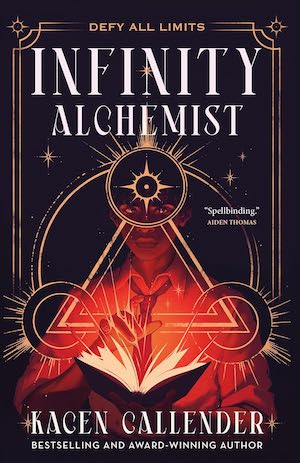

Infinity Alchemist
It’s in this environment that eighteen-year-old Ashen Woods scrapes together enough money to apply to Lancaster College for the study of alchemy, and is rejected. This is even more devastating because the father that Ash has never known, respected alchemist and politician Gresham Hain, teaches at Lancaster. Motivated by the desire to finally meet his absentee parent, as well as the need to get a job outside of his gang-ruled neighborhood, Ash takes the position of assistant groundskeeper at the college. While watering the plants in mysterious youngest-professor-ever Ramsay Thorne’s office, Ash finds research notes about a search for the Book of Source: a mythical text said to align any reader so perfectly with Source that they would become the most powerful alchemist imaginable. Noting a symbol in the notes, Ash manifests it in metal, only to be caught by Thorne—who realizes that Ash is who the gender-shifting professor needs to achieve his goal and find the very real Book of Source. The two strike a deal, where Ash helps Ramsay and she teaches Ash to pass the license exam. Naturally, it isn’t that easy. Their strong personalities clash, but eventually mutual irritation turns to attraction and then to love. Now a team, the pair’s hunt for the Book throws them in the path of danger and puts them in opposition to the very person Ash most wants to earn the respect of: his father, Gresham Hain. Pursuing their mission nonetheless, Ash gets arrested and put under the control of Ramsay’s ex Callum, redguard and son to the ruthless leader of House Kendrick. Yet Callum is not what he seems, and the journey to the Book’s hiding place ends up being more fraught than Ramsay ever expected.
I could continue writing about the plot of Infinity Alchemist all day, but in the interests of avoiding too many spoilers, I’ll pivot to gushing about Ash. He is no noble milquetoast of a Righteous Hero. Instead, Ash behaves like a real teenager fueled by past grief and trauma. He is angry at the world and impulsive, learning from his mistakes slowly, if at all. His moral code is strong, but his demonstration of it relies more on principle than practicality, and at times his self-interest gets in the way. Ash is also persistent and clever and brave and full of love. In short, he’s a fascinating protagonist. I love rooting for characters who frustrate me and inspire me in turn—and it isn’t only Ash who falls into this category. Ramsay and Callum are both precisely-drawn characters that remain true to their backstories, who will disappoint on one page only to blaze brilliant on the next. In a slight spoiler, reading the relationships between these characters also healed me from every time I’ve read a love triangle and thought it would all be okay if everyone just realized it’s possible and FINE to love more than one person.
Callender’s magic system is another successful pillar of their novel. Basing alchemy on the energy that makes up all life allows its foundation to be intuitive, while the actual spells and academic knowledge detailed in the book are almost too esoteric for me to understand. Which I love! If magic takes years of practice and study to master, I don’t want to understand it all by chapter five. Even Ash is initially bewildered by the complexity of Source, setting him on a beautiful arc towards understanding that all life is one and the same, connected by shared energy from the universe.
Yet seeing all life with love is not the only way to power in New Anglia. Most of the House leaders as well as egomaniacal Gresham Hain force Source to bend to their wills. In the vein of Bruno Bettelheim claiming that fairytales were a way for children to confront their worst fears, having Callum and Ash’s fathers be the primary oppressive forces is a compellingly traditional choice from Callender. It may bear mythic flavor for some readers, but for others it will reflect very real intolerance and rejection on the part of their family members. These villains are also a neat metaphor for the ways young people are confronting the inhumane systems that previous generations have deeply invested in.
One last thing: For folks like me who hesitate to start reading a series before it’s complete, rest assured that Infinity Alchemist has a satisfying ending. Despite a brief teaser of a vague future threat, the novel could be a standalone—except for the fact that these characters left me so hungry for more. I can’t wait for Callender to release the second in this series, especially because it means I’ll have to reread this phenomenal first installment.
Infinity Alchemist is published by Tor Teen.










